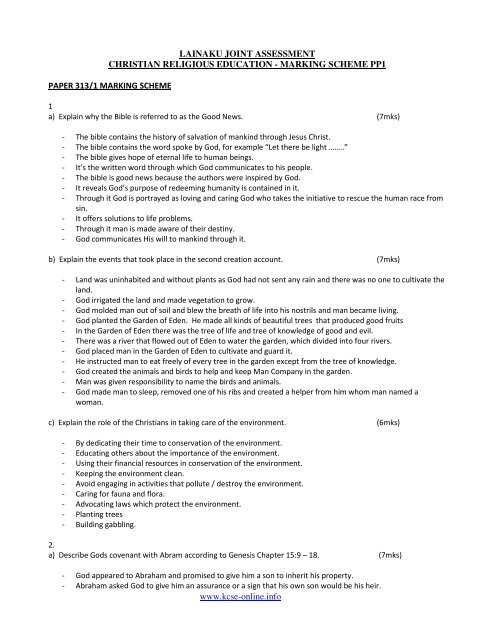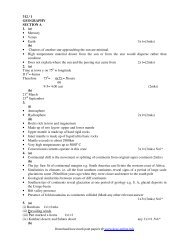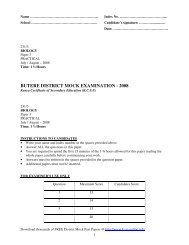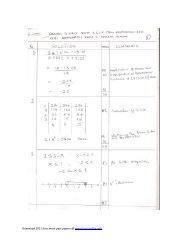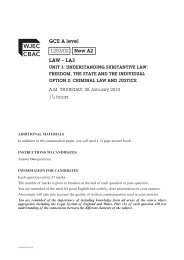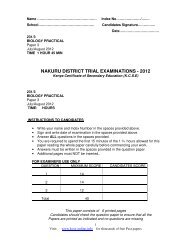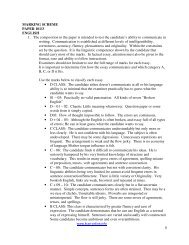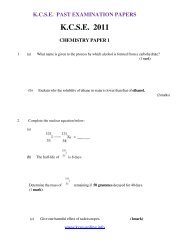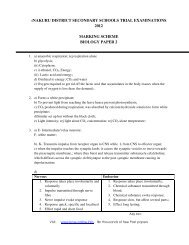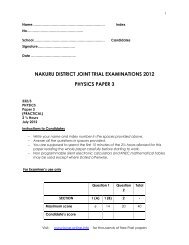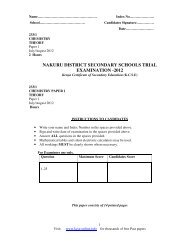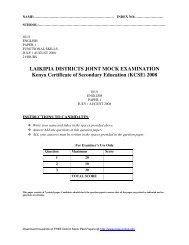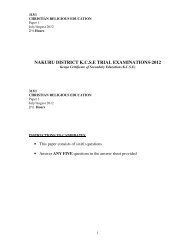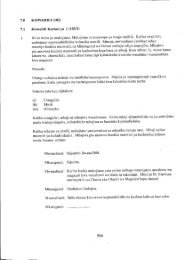www.kcse-online.info LAINAKU JOINT ASSESSMENT CHRISTIAN ...
www.kcse-online.info LAINAKU JOINT ASSESSMENT CHRISTIAN ...
www.kcse-online.info LAINAKU JOINT ASSESSMENT CHRISTIAN ...
You also want an ePaper? Increase the reach of your titles
YUMPU automatically turns print PDFs into web optimized ePapers that Google loves.
<strong>LAINAKU</strong> <strong>JOINT</strong> <strong>ASSESSMENT</strong><strong>CHRISTIAN</strong> RELIGIOUS EDUCATION - MARKING SCHEME PP1PAPER 313/1 MARKING SCHEME1a) Explain why the Bible is referred to as the Good News. (7mks)- The bible contains the history of salvation of mankind through Jesus Christ.- The bible contains the word spoke by God, for example “Let there be light ……..”- The bible gives hope of eternal life to human beings.- It’s the written word through which God communicates to his people.- The bible is good news because the authors were inspired by God.- It reveals God’s purpose of redeeming humanity is contained in it.- Through it God is portrayed as loving and caring God who takes the initiative to rescue the human race fromsin.- It offers solutions to life problems.- Through it man is made aware of their destiny.- God communicates His will to mankind through it.b) Explain the events that took place in the second creation account. (7mks)- Land was uninhabited and without plants as God had not sent any rain and there was no one to cultivate theland.- God irrigated the land and made vegetation to grow.- God molded man out of soil and blew the breath of life into his nostrils and man became living.- God planted the Garden of Eden. He made all kinds of beautiful trees that produced good fruits- In the Garden of Eden there was the tree of life and tree of knowledge of good and evil.- There was a river that flowed out of Eden to water the garden, which divided into four rivers.- God placed man in the Garden of Eden to cultivate and guard it.- He instructed man to eat freely of every tree in the garden except from the tree of knowledge.- God created the animals and birds to help and keep Man Company in the garden.- Man was given responsibility to name the birds and animals.- God made man to sleep, removed one of his ribs and created a helper from him whom man named awoman.c) Explain the role of the Christians in taking care of the environment. (6mks)- By dedicating their time to conservation of the environment.- Educating others about the importance of the environment.- Using their financial resources in conservation of the environment.- Keeping the environment clean.- Avoid engaging in activities that pollute / destroy the environment.- Caring for fauna and flora.- Advocating laws which protect the environment.- Planting trees- Building gabbling.2.a) Describe Gods covenant with Abram according to Genesis Chapter 15:9 – 18. (7mks)- God appeared to Abraham and promised to give him a son to inherit his property.- Abraham asked God to give him an assurance or a sign that his own son would be his heir.<strong>www</strong>.<strong>kcse</strong>-<strong>online</strong>.<strong>info</strong>
- God responded to Abraham’s request by asking Abraham to bring a heifer a she-goat, a ram all three yearsold, a turtle dove and a young pigeon.- Abraham cut the animals into halves except the birds.- He laid them side by side in two rows on the altar.- Abraham guarded the sacrifice and drove away the birds of prey that came to eat the carcasses.- At sunset, Abraham fell into a deep sleep and a thick darkness came over him.- God gave Abraham other promises.- A smoking fire pot and flaming torch appeared and passed in between the pieces of meat. Thus God made acovenant with Abraham.b) Explain the difference between the Jewish circumcision and the traditional circumcision. (8mks)- In Jewish and African practice, only males are circumcised while in African set up some communitiescircumcise both boys and girls.- For Jews, circumcision symbolizes that they have become God’s people, while the Africans consideredcircumcision as a rite of passage from childhood to adulthood.- Circumcision in Jewish community takes place when a baby boy is eight days old while most Africancommunities circumcision is done at puberty age.- Jews circumcision was a command from God as a sign of covenant with Him whereas most Africancommunities do it in obedience to ancestor’s customs and traditions of their communities.- The rite is not seasonal among the Jews whose among most African communities it is a seasonal event- For Africans after circumcision one was entrusted with responsibilities e.g. homage, property ownership etcwhile among the Jewish the child was very young to handle any responsibilities.- There is no seclusion period among the Jewish as it is the case I most African communities.- Traditional African circumcision practice involves tests of courage, bravery / endurance while for Jews it wasa test of faith and commitment to God.c) Identify five challenges that Christians face while practicing their faith in Kenya today. (5mks)- Lack of adequate funds and other resources to effectively preach the gospel.- Rejection by family members and close friends.- Persecution for the sake of the gospel.- Lack of adequate funds to effectively preach the gospel.- Language barrier.- Tribalism- Poor means of transport and communication.3a) Identify seven features of the Canaanite religion. (7mks)- It was a nature religion. It was related to the forces of nature i.e. rain, drought etc. . cosmic religion- It was cyclic i.e. the seasons were repeated in contrast to Yahweism which was linear.- It comprised a family of gods i.e. El, Baal, Asherah, Mot, Polytheistic.- Symbols were used to represent each god e.g. Baal was represented <strong>info</strong>rm of a bull.- They practiced temple prostitution.- They had many places of worship e.g. temple, hilltops, etc.- It was a fertility religion.- Human sacrifices were offered to gods.- They had prophets and prophetesses / priests dedicated to the service of gods and goddesses.b) Explain how the leadership of Israel contributed to schism in Israel. (7mks)- Solomon married many foreign wives and who brought with them the worship of idol gods and thisdispleased God.<strong>www</strong>.<strong>kcse</strong>-<strong>online</strong>.<strong>info</strong>
- In order to support his harem of wives and court officials, Solomon needed a lot of money which he got byovertaxing his people. This was oppression.- Solomon spent years and resources in his building projects and hence introduced forced labour which madethe Israelites dissatisfied with Solomon’s harsh rule.- There was the long standing internal conflict in the house of David.- Rehoboams foolish answer where he promised to rule the Israelites move harshly than his father David.- Solomon sold a piece of Israel’s land that caused National dissatisfaction.- Solomon practiced nepotism and this made the Northerners bitter with his rule.c) State the factors that have led to increase of Christian denominations in Kenya. (6mks)- Love for money and selfishness.- Lack of religious and moral teachings.- Greed for power and authority.- Devil worship- Differences in religious doctrines or beliefs e.g. pertaining baptism, sacrament etc.- Ethnicity /tribalism where denominations came of along tribal lines.- Freedom of worship.4a) State the differences between prophets in the Old Testament and African traditional communities.(4 x 2) (8mks)- Old Testament prophets communicated with God alone while T.A prophets communicated with God, spiritsand ancestors.- O.T prophets faced oppositions most of the time whereas R.A prophets were highly respected and obeyed.- O.T prophets were not diviners whereas T.A prophets were also diviners.- O.T prophets were also preachers unlike T.A prophets who warned people against misfortunes or futureevents.- O.T prophets received their calling from God as prophets wile T.A society they inherited the skill or receivedthe calling from the living dead.- The O.T. prophets /prophesy were universal whereas T.A prophets /prophesy were limited to theircommunities.- O.T. prophets performed miracles and symbolic actions as directed by God whereas T.A prophets did notperform miracles or act symbolically.b) Explain Amos teaching on the Day of the lord. (6mks)- It would be a day when he wicked people of Israel would face God’s wrath.- It would not be a day of light but darkness or doom.- It would be a day of suffering for the people of Israel and no one would escape from God’s punishment.- It would be a day of terror and disaster for the rich land owners and rulers who had developed in theireconomic and political powers.- It would be accompanied by cosmic signs such as the eclipse of the sun.- It would be a day when God would send earthquakes leading to destruction of farms and buildings.- It would be a day of wailing and mourning in the nation.- Death would be widespread and grief of survivors would be too great to bear.- It would be a day of famine and drought for the word of God.c) How do Christians prepare themselves for the second coming of Jesus Christ? (6mks)- Through repentance and asking for forgiveness.- Through avoidance and condemning of evils.<strong>www</strong>.<strong>kcse</strong>-<strong>online</strong>.<strong>info</strong>
- Preaching the word of God.- Helping the needy / less fortunate in the society.- Keeping God’s commandments.- Paying their Tithes and offerings.- Leading exemplary lives by writing Christian literature fellowshipping together.5a) Describe the characteristics of the new covenant as prophesied by prophet Jeremiah. (7mks)- In the new covenant God’s law would be written in people’s heart.- Each individual would have a personal knowledge of God from the greatest to the smallest.- It would be an everlasting covenant because it would never be broken again.- There would be spontaneous forgiveness then no more.- Each individual will be responsible for his/her own sins- The new covenant would be established after God’s punishment.- The new covenant would bring into being a new community, Yahweh’s people, known as the new Israel.- It would be sealed using the blood of the Lamb / Lord Jesus Christ.b) Outline how Nehemiah portrayed his leadership qualities. (8mks)- Trust in God . He was God fearing. He demonstrated this in his prayerful life.- Being prayerful. He constantly sought God’s guidance and will in all his undertakings. He also prayed forcourage, strength, security from God and even interceded for the people of Israel.- Courage. Nehemiah bravely faced opposition. He also encouraged the Jews to be brave as the enemiesthreatened to attack them.- Hardworking and commitment. Inspite of the many problems, Nehemiah and his group did not give up.- Team spirit: Nehemiah joined the workers in the construction work and stayed with them when His life wasthreatened.- Planning and organization skills. Nehemiah had visionary, he set realistic goals and planned how to attainthem.- Compassion: He showed genuine concern for the welfare of his people e.g. He cared for the poor and urgedhis fellow Jews not to oppress their neighbours.- Patriotism: He loved his people and the ancestral land hence he took the initiative to return home and helprebuild their nation. He gave up comfortable and wealthy position in person to rebuild the wall of Jerusalem.- Wisdom and decisiveness. He made wise decisions e.g. He knew the letters he received from sanballat weredishonest and were intended to frighten him from continuing with his mission hence stood firm.- Role model: He led by examples, he practiced what he taught.- Honest: When he did well he prayed to God to reward him.c) State the problems Christian leaders face in their work in Kenya today. (5mks)- Opposition by some members of the church / community.- They face danger and hostility.- They are persecuted for the sake of the gospel.- Lack of adequate finances.- Rejection by their families and friends.- Rivalry and completion among themselves- Political interference- Family commitments may deny them time for Gods work.- Language barrier- Insecurity I some parts of the country.6a) Explain the rituals associated with death in the African societies. (6mks)<strong>www</strong>.<strong>kcse</strong>-<strong>online</strong>.<strong>info</strong>
- Sacrifices were offered to introduce the deceased to the spirit world.- Most communities poured libations to feed the living dead.- The dead were buried carefully in selected places in the ancestral land to remain close to the family.- Members of the family, friends and neighbours observed a period of mourning.- There was song and dance as a way of expressing sorrow and sending off the departed.- Washing of the corpse with water and herbs to preserve it and send it clean to the spirit world.- The dead were buried with their belongings for use in the next world.- After burial, close relatives shaved their hair to signify the separation of one of their members from themand for cleansing purpose.- Pregnant women and children are not allowed to touch or come in close contact with the corpse so thatmisfortunes do not befall them.- The body was buried facing a certain direction according to the customs of the people.- In some communities there is feasting and drinking of beer.b) What are the roles played by the rites of passage in inculcating moral values in the African societies?(7mks)- Obedience: This moral value was re<strong>info</strong>rced during initiation and marriage; children were taught to beobedient to parents, older brothers and sisters etc.- Respect: People were taught to respect their parents; other people and their property .They were alsoexpected to respect the elders and customs of the community. This was taught during initiation andmarriage.- Self-control. The young are taught the need to have self-control in all life situations e.g. on sexual affairs.How to control their feelings etc.- Courage: Parents and community members teach young people to be courageous so that they are able toface life challenges. The young are expected to defend their people and property in case of an attack hencecowards are despised.Other moral value include- Hard work.- Responsibility- Patriotism- Hospitality- Mutual concern and sharing- Loyalty- Honesty- Thankfulness etc. Also these are inculcated in the rites of passage.c ) State the importance of children in African traditional communities.(7mks)- Children ensured continuity and survival of a family, clan and community.- Children cemented marital relationships by making it complete.- Children took care of their parents in old age.- They are a source of wealth especially through bride it is paid for daughters.- Boys provided security / protection to their families / clans / communities.- Children are a source of labour.- They promoted the social status of their parents.- Children promoted mutual harmony and social responsibility through the rites of passage.- Through the naming of children, the dead were reincarnate d.- Children inherited the family’s property after the death of their parents.- They give their parents a decent burial.<strong>www</strong>.<strong>kcse</strong>-<strong>online</strong>.<strong>info</strong>


